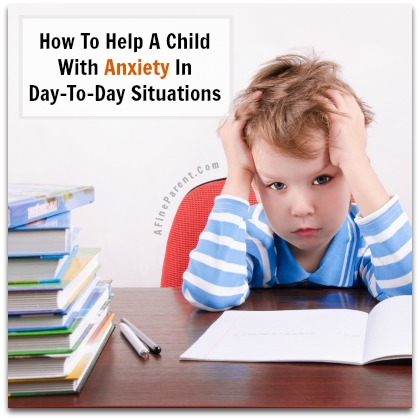 Will you do something for me? Humor me here.
Will you do something for me? Humor me here.
I want you to think about a recent situation you found yourself in that made you feel anxious.
Maybe it was a big meeting or presentation at work. Maybe it was a job interview or a public speaking gig. Maybe it was walking into a doctor’s office or the dentist. Maybe it was because you had a fender bender or forgot to pay a bill. Maybe it was as you were dialing a number to have a conversation with someone that you knew wasn’t going to go well.
Now think about how it made you feel.
Sweaty palms. Racing heart. Shaking hands. The feeling you have to use the bathroom. The feeling you can’t quite catch your breath. Restless legs. Clenched fists. Shutting down. Dizziness. Upset stomach. Tense muscles.
Now think about how that must feel to our children; with their young minds and not yet fully developed coping skills.
Anxiety.
It’s a normal part of our human existence. Everyone feels anxiety at times, as we inevitably will have experiences that present as “high stakes.” Think about professional athletes and how they feel when walking onto the court, the track, the field. Although they may not outwardly show it, even the most seasoned athlete experiences nerves.
The great Michael Jordan admitted that his first go-around in the NBA finals in 1991 was lost due to allowing his adrenalin and the pressure exhaust him. It is years of experience that lead professional athletes to find coping strategies that allow them to handle anxiety, rather than allowing it to rule their play. Many years after that experience, Michael Jordan has learned to coach other athletes on keeping nerves at bay by telling them to never think about the pressure or stakes of a game.
Our young children don’t have the years of experience that professional athletes have.
Fear, stress, anxiety, nerves can feel unfamiliar, confusing, even terrifying. Anxiety may start with a baby who has just become aware enough of mom’s presence that he cries when she leaves. As children grow older and become more aware of their own strengths, weaknesses, and how failure can make them feel, anxiety becomes an emotion that they will experience again and again as all humans do.
Some children will have a more natural capacity for finding their own coping strategies. A more anxious child may need more reassurance and guidance from the adults they trust.
Regardless of the personality of your own little one, there are positive ways that we can encourage our children to handle anxiety that can transfer into life-long coping skills. It really just boils down to reshaping how WE react to the anxiety our children experience.
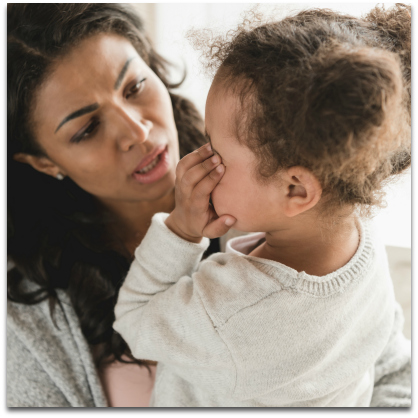 It’s easy to become frustrated when we have a little one clinging to our leg during drop off at a new daycare or school; or as they hesitate to join in an activity they love, because they are shy or hesitant around new people; or they can’t stop worrying that someone else at the prom will be wearing the same dress as them.
It’s easy to become frustrated when we have a little one clinging to our leg during drop off at a new daycare or school; or as they hesitate to join in an activity they love, because they are shy or hesitant around new people; or they can’t stop worrying that someone else at the prom will be wearing the same dress as them.
Why is it frustrating? It’s frustrating because:
- Our child is struggling to get through something we know they love or could be good at or is very unlikely to happen
- We do not want our child to suffer from difficult emotions
- We cannot “fix it”
- Raising children is already hard work and at times, exhausting. Helping a child work through anxiety is even more hard work and exhausting.
Now think about how feeling frustrated leads us to act in our parenting, particularly in those moments of anxiety or future situations that we predict will bring back those same feelings:
- We may discount their fears by telling them they SHOULD NOT be feeling that way
- We may give negative consequences for not participating in something
- We may avoid talking about the anxiety for fear that it will bring back the emotion
- We may attempt to avoid future similar situations that we believe will induce the same fears
So then what could be the outcome of the above actions?
Well, we may accidentally make our children feel like they are being bad for experiencing a very human emotion. We may accidentally teach that avoidance is the best coping skill for anxiety. We may let our own anxiety about our children’s anxiety create a self-fulfilling prophecy. We may even accidentally change how our children feel about skills or experiences that were initially fun for them.
And what does all of this do?
It empowers the anxiety.
So here’s where reshaping our thinking is key to helping our children learn to deal with anxiety in positive ways. Write this down, because you’re going to want to remember it:
Instead of empowering the anxiety, we want to empower our child to tackle the anxiety.
Okay, so seems simple enough right? Empower the child, not the anxiety. Separate the child from the anxiety.
Yet it’s not so easy!
In the throes of the beast, it can be so very hard to remember this and react in ways that truly empower our child. I am a behavior specialist by profession and a mom of three children myself. Here are some of the simple steps that will help you avoid empowering your child’s anxiety.
Step 1: Acknowledge the beast
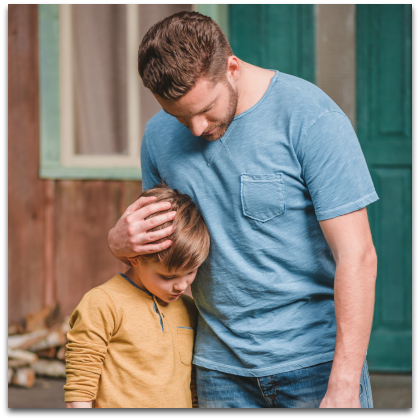 Helping your child understand what anxiety is and how to give recognition to fear is equivalent to grabbing the bull by its horns. Ask questions about what makes them anxious- and encourage them to be specific.
Helping your child understand what anxiety is and how to give recognition to fear is equivalent to grabbing the bull by its horns. Ask questions about what makes them anxious- and encourage them to be specific.
What part of the baseball game makes you feel the most nervous? Do you still feel that way after the game starts?
I love the idea that child therapist, Natasha Daniels discusses here for teaching kids how anxiety works in negative ways to create false alarms in our minds; and how we can combat those false alarms with positive thoughts.
Helping our children acknowledge their fears means having a conversation… which is also conveniently the opposite of not having the conversation!
It also means that we need to listen and do our own acknowledging, as we can’t just brush aside our child’s emotions and feelings if we are truly trying to help them acknowledge those emotions.
Remember- it is the situation itself that is upsetting to our child; not the conversation about it.
Step 2: Develop a battle plan
Michael Phelps deals with prerace nerves by envisioning his race, all that could go wrong, and what he would do if those things came true. “If my suit ripped or if my goggles broke, you know, what would I do?” Having a plan helps ease anxiety associated with scenarios that are most likely the false alarms that our mind is playing tricks on us with.
And if they aren’t false alarms- then what is the plan from there? Has that scenario happened before? What’s the worst that could come of it happening?
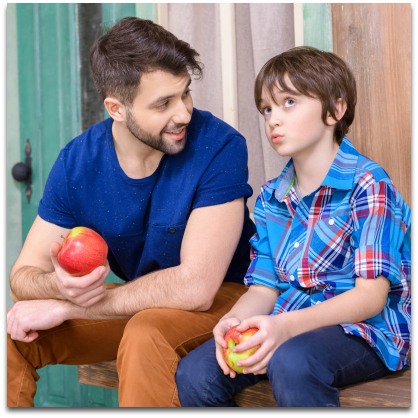 Okay, so you strike out… then what? You walk off the field and move onto the next play.
Okay, so you strike out… then what? You walk off the field and move onto the next play.
If we’re going to talk about teaching calming techniques, these may come into play with our plan as well.
What physical acts might help that feeling in our stomach or slow our heartrate down? Do you need to take some deep breaths… do you need to count down from ten or visualize something that provides a sense of calm? Would it be beneficial to counteract nerves with a quick physical burst of activity, such as jumping jacks?
Developing a plan is also a good time to talk with your child about how the discomfort of anxiety is a temporary feeling… and how there will be an end point when the situation has ended- or in many cases, when the anticipation is over and the situation has started.
Most athletes feel nerves before the race that quickly dissolve when the race starts. The minutes leading up to the first day of school may include nerves, but they most likely will dissipate as you are meeting new friends and listening to the new rules of your classroom.
Do you remember in the movie Sing when Meenah was afraid to go onto stage? Mike took her hand, pulled her to stage and said, “you will not be afraid anymore if you just start singing.”
Step 3: Don’t reinforce fears
Okay, so these last two steps have more to do with our own behavior than our child’s. Keep in mind that behavior influences behavior. This is true for the interactions between all humans, but especially true for the behavior that bounces back and forth between parent and child.
Let me say it again: Behavior influences behavior.
Our job as parents is to share our calm, not add to chaos.
If we respond to anxiety with anxiety, what can we expect the outcome to be? In the same sense, if we approach situations that we THINK may be invoke nerves in a way that suggests they should feel that way, can you predict how that will end?
Think about it this way- because we care SO MUCH about our children, we may unintentionally react to situations in a way that confirms that anxiety is the right reaction to the problem.
Your daughter comes home with stories of drama and nasty comments from other girls and you go into a tizzy, calling other mothers or going on about how girls can be so mean. Although our intentions may come from love, caring too much or advocating too hard for our children may not only give the impression that anxiety is the right way to handle a problem, but also that they shouldn’t be able to find an alternative solution by themselves.
Even in situations when our children struggle at a skill that is not a strength, compensating for their weaknesses may only lead to a lack of the development of positive coping skills and increased anxiety for future situations that they are not prepared for.
So what can we do to ensure that our behaviors have a positive influence on the behavior of our kids as they learn to cope with anxiety? Karen Banes from the Washington Post has a few suggestions, including the following:
- Be an emotional rock for your child, even if you also feel anxiety inside
- Help your child find a solution that they can implement without your assistance- isn’t this whole parenting thing all about teaching them how to fly on their own?!
- Build confidence by spending time doing things that are strengths of your child
- In the same sense, be careful that your expectations for your child’s strengths don’t become so escalated that they too become a source of anxiety.
Step 4: Model healthy ways of coping with anxiety
See that first bullet point right above- the one about being an emotional rock for your child, even if you also feel anxiety inside? Let’s talk about that a little more.
Living in the Baltimore metro area means getting stuck in traffic on a normal basis. I also have to drive quite far on a tight schedule to get my oldest to school in the mornings. Every single minute counts in the morning and something as simple as an extra red light, backup from a car pulled over or getting stuck on the one lane road behind someone going well below the speed limit can be the difference between getting to work late and getting to work really late.
When my son started to make comments about the cars around us such as, “WHAT is that guy doing?!” and “Come on people, the light is green!” I realized that something needed to change.
My son had no reason to be anxious or frustrated while riding in the car in the morning. At nine he wasn’t aware of traffic patterns, rules, or speed limits… and he was never at risk of being late for school.
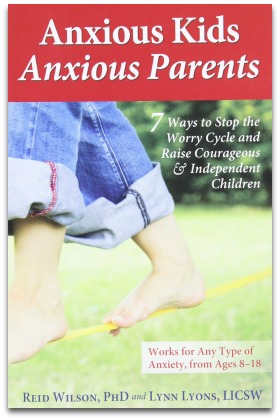 However, my anxiety about being late for work was displayed through my behavior- and my son’s behavior was influenced as a result of it. I have had to find ways to lower my own anxiety about getting stuck in traffic in the morning; and on mornings that is unsuccessful, I have to do my best to demonstrate calm instead of chaos.
However, my anxiety about being late for work was displayed through my behavior- and my son’s behavior was influenced as a result of it. I have had to find ways to lower my own anxiety about getting stuck in traffic in the morning; and on mornings that is unsuccessful, I have to do my best to demonstrate calm instead of chaos.
Anxiety and stress are normal parts of normal humanhood. It’s not bad that you have anxiety or stress- it’s about how your children watch you cope with it. Dr. Reid Wilson, co-writer of Anxious Kids, Anxious Parents: 7 Ways to Stop the Worry Cycle and Raise Courageous & Independent Children, says that sharing our own fearful experiences with our children and then modeling positive ways of dealing with them can help normalize anxiety and teach that it can be overcome.
Wilson also stresses that parents be aware of their facial expressions and body language, as children are extremely perceptive in picking up the emotions behind our nonverbal cues. It’s important that we avoid masking our fears, while still demonstrating confidence in dealing with them.
When Worries Are More Than Just Worries
All children will demonstrate phases of anxiety, which is a normal party of child development; even if the phase we are observing seems strange to us. Some children may decide for a few weeks that they are only going to eat foods that are orange or wear clothes that are green. Other children may develop an imaginary friend or have a recurring nightmare. Situational anxiety or phases like these should come and go and there should be benefit seen when the child is provided comfort and support by adults.
Earlier I talked about how teaching a child to remind themselves that the side effects of anxiety are temporary and will not last. If you observe signs or if your child is able to verbalize that this is not the case- it may indicate that your child is experiencing anxiety that is out of the “normal” range.
In addition to persistent worry, if your child’s anxieties are out of proportion or if they interfere with their life and health development, it may be time to get some extra help. The difference between normal worry and an anxiety disorder is severity.
Children can experience a variety of anxiety disorders, including generalized anxiety disorder, obsessive-compulsive disorder, panic disorder, posttraumatic stress disorder, social anxiety disorder, separation anxiety disorder, selective mutism, and specific phobias.
If you suspect that your child’s anxiety is more than what is normal, it may be beneficial to read more about the different types of anxiety disorders and their possible symptoms here or read this for more specific symptoms of young children.
While you may choose to educate yourself, avoid diagnosing your child. It is so very important to reach out to professionals that can assist in determining if they need extra help and how that extra help should look.
If you are anything like me, there is a good chance that when you have concerns about your child you become better at doing research than an FBI agent. Let me point you in the direction of two amazing resources, as they were referenced to me by a good friend and colleague, who also happens to be a Licensed Clinical Social Worker (LCSW).
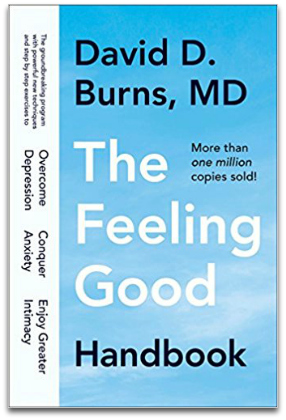 David Burns, MD, is an adjunct professor emeritus in the Department of Psychiatry and Behavioral Sciences at Stanford University and author of Feeling Good: The New Mood Therapy and The Feeling Good Handbook. Burns is the guru of anxiety disorders and his books greatly popularized Aaron T. Beck’s cognitive behavior therapy (CBT) when they were published. You can follow Dr. Burns on Facebook, or his Feeling Good website, where he has weekly podcasts every Sunday afternoon. If you have the time to read this, I hope you will be as blown away as I was by Dr. Burns’ interactions with a patient experiencing a panic attack.
David Burns, MD, is an adjunct professor emeritus in the Department of Psychiatry and Behavioral Sciences at Stanford University and author of Feeling Good: The New Mood Therapy and The Feeling Good Handbook. Burns is the guru of anxiety disorders and his books greatly popularized Aaron T. Beck’s cognitive behavior therapy (CBT) when they were published. You can follow Dr. Burns on Facebook, or his Feeling Good website, where he has weekly podcasts every Sunday afternoon. If you have the time to read this, I hope you will be as blown away as I was by Dr. Burns’ interactions with a patient experiencing a panic attack.
Finally, let’s go back to Dr. Aaron Beck, his daughter Dr. Judith Beck and their Beck Institute for Cognitive Behavior Therapy. If you want access to a wealth of knowledge regarding both anxiety and depression, just go to their blog right here, including this specific article written by Dr. Judith Beck and Dr. Robert Hindman, about why anxiety persists. This is a good read as it gives insight on the behavioral strategies and beliefs that people suffering from anxiety disorders may demonstrate.
2-Minute Action Plan for Fine Parents
For our quick action plan, think of a recent situation in which your child demonstrated some signs of nerves or anxiety and ask yourself these questions:
- What outward signs did my child demonstrate that showed me they were nervous?
- How did it make me feel to observe my child having those emotions?
- What was my outward reaction to my child’s nerves- what did I say with my words or what was my body language?
- Did my reaction seem to aid in how my child was positively able to handle the anxiety or did it instead seem to increase the anxiety?
- What is one thing I could change about my reaction in the moment?
I would suggest writing down the one thing you are going to work on changing in the moment in a very simple “remember” sentence. For example, “remember to relax your face and uncross your arms,” or “remember to avoid giving a consequence for not participating.” Keep that remember sentence somewhere handy, so that you can glance at it quickly as needed in the moment.
Long-Term Action Plan for Fine Parents
For the long-term action plan, think about patterns in situations in which you observe your child becoming anxious. Perhaps it is social situations with new adults or perhaps she’s fine with adults but very nervous around peers. Perhaps it’s the anticipation of a sports game or you notice it prior to test taking days at school.
Once you’ve observed a pattern, think about one way from the steps above that you can better empower your child to tackle the anxiety. Here are some suggestions:
- For an older child it may be having a conversation with them about how anxiety works so that they can better identify the “false alarms” the mind can trick us into believing.
- For an older child it may mean sharing with your child what situations used to or still do make you feel anxiety- and how you learned to cope with it positively.
- For a younger child, maybe it means focusing on your own anxiety and the coping strategies (or lack of) that your child may be observing.
- For a younger child, perhaps it means going back up to the 2-minute action plan above and really just focusing on how you react when your child is demonstrating anxiety.
Once you have your specific action plan, follow through on it and then give it some time to work!
Remember that nothing is going to work overnight- but the key to your child coping with anxiety is to empower them to do so!
I wish more authors of this type of content would take the time you did to research and write so well. I am very impressed with your vision and insight.
Hi Saim, Thank you so much for your compliment and thank you for being a AFP reader and community member!
Thank you for your amazing compliment. It sounds like your child trusts you a LOT to come to you and say that- which says much about the positive relationship you have built!
Thanks for writing this article. keep writing useful articles like this, keep it up.
Thank you Donald!
Thank you so much for this information. My ten year old came to me after sch0ol and told me that she had bad anxiety. I wasn’t sure what to say so I listened to what happened and I explained to her that I understood where she was coming from because I dealt with the same thing back in my day. I also explained to her that anxiety is hard to deal with and that I would do some research to see if we can’t find some tools that she can use at school to help her through this time. I came across this page and it really helped me understand and also gave me some tools to help her get started in being able to manage her anxiety when she isn’t with her dad or I. Thanks again.
this is very helpful for me. thanks
You’re welcome, Alex! Good luck!
Thanks so much for his Leah. The more I read the more I realise my own parents got it totally wrong and still at 70!. Well, despite the person it made of me , I am determined to help my children not to grow how I had to, and it involves working pretty hard on myself to keep calm, rational, in control of my emotions so my children can emulate this from me -unlike me as a child with my totally irrational screaming angry parents. Thanks again! And wish me luck.
Stephanie, thank you for your positive feedback and comment! It sounds like you have a lot of self awareness, which is amazing. Good luck!
Its cost alot to raise a child٫But also rewarding….
This is the best post on my career I have found today. Honestly, your a great writer
Thank you so much!
Very interesting article. A special thanks to Leah for writing it. Even though I do not have children of my own, I know that parenting is not easy. Being able to deal with a child’s anxiety is something that some parents don’t even know how to do. So I really appreciate you sharing this information, Sumitha. I was able to help my little nephew with his anxiety.
Ron, thank you for reading and I’m so happy that it was helpful information! Even if you don’t have children, the role of uncle/aunt, etc is a very important one! Glad you were able to help your nephew.
It very true raising children positivly is not a simple task.
I just want to appreciate your writing skills.
Thank you so much for that compliment and thank you for reading! Yes, raising children is no easy task- but also very rewarding!